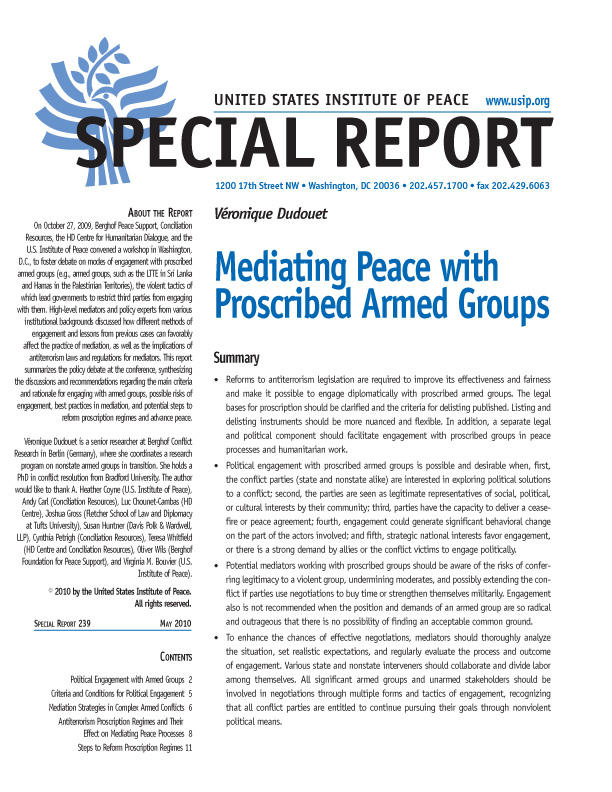Mediating Peace with Proscribed Armed Groups

Summary
- Reforms to antiterrorism legislation are required to improve its effectiveness and fairness and make it possible to engage diplomatically with proscribed armed groups. The legal bases for proscription should be clarified and the criteria for delisting published. Listing and delisting instruments should be more nuanced and flexible. In addition, a separate legal and political component should facilitate engagement with proscribed groups in peace processes and humanitarian work.
- Political engagement with proscribed armed groups is possible and desirable when, first, the conflict parties (state and nonstate alike) are interested in exploring political solutions to a conflict; second, the parties are seen as legitimate representatives of social, political, or cultural interests by their community; third, parties have the capacity to deliver a ceasefire or peace agreement; fourth, engagement could generate significant behavioral change on the part of the actors involved; and fifth, strategic national interests favor engagement, or there is a strong demand by allies or the conflict victims to engage politically.
- Potential mediators working with proscribed groups should be aware of the risks of conferring legitimacy to a violent group, undermining moderates, and possibly extending the conflict if parties use negotiations to buy time or strengthen themselves militarily. Engagement also is not recommended when the position and demands of an armed group are so radical and outrageous that there is no possibility of finding an acceptable common ground.
- To enhance the chances of effective negotiations, mediators should thoroughly analyze the situation, set realistic expectations, and regularly evaluate the process and outcome of engagement. Various state and nonstate interveners should collaborate and divide labor among themselves. All significant armed groups and unarmed stakeholders should be involved in negotiations through multiple forms and tactics of engagement, recognizing that all conflict parties are entitled to continue pursuing their goals through nonviolent political means.
About the Report
On October 27, 2009, Berghof Peace Support, Conciliation Resources, the HD Centre for Humanitarian Dialogue, and the U.S. Institute of Peace convened a workshop in Washington, D.C., to foster debate on modes of engagement with proscribed armed groups (e.g., armed groups, such as the LTTE in Sri Lanka and Hamas in the Palestinian Territories), the violent tactics of which lead governments to restrict third parties from engaging with them. High-level mediators and policy experts from various institutional backgrounds discussed how different methods of engagement and lessons from previous cases can favorably affect the practice of mediation, as well as the implications of antiterrorism laws and regulations for mediators. This report summarizes the policy debate at the conference, synthesizing the discussions and recommendations regarding the main criteria and rationale for engaging with armed groups, possible risks of engagement, best practices in mediation, and potential steps to reform proscription regimes and advance peace.
Véronique Dudouet is a senior researcher at Berghof Conflict Research in Berlin (Germany), where she coordinates a research program on nonstate armed groups in transition. She holds a PhD in conflict resolution from Bradford University. The author would like to thank A. Heather Coyne (U.S. Institute of Peace), Andy Carl (Conciliation Resources), Luc Chounet-Cambas (HD Centre), Joshua Gross (Fletcher School of Law and Diplomacy at Tufts University), Susan Hunter (Davis Polk & Wardwell, LLP), Cynthia Petrigh (Conciliation Resources), Teresa Whitfield (HD Centre and Conciliation Resources), Oliver Wils (Berghof Foundation for Peace Support), and Virginia M. Bouvier (U.S. Institute of Peace).



